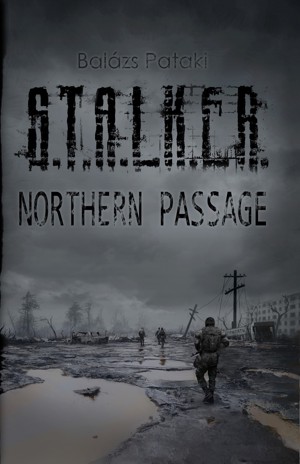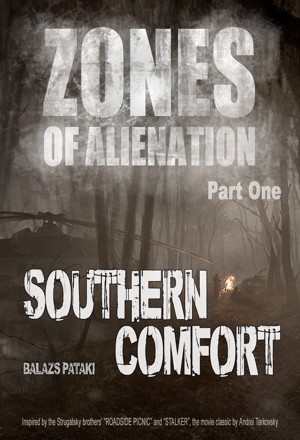Location: Belgium
Member Since:
Dec. 08, 2012
11 readers have added this author as a 'Favorite Author'.
Balazs Pataki
Books
Master of the Seven Skies
by Balazs Pataki
Price:
$3.99 USD.
Words: 68,910.
Language:
English.
Published: December 23, 2013
.
Categories:
Fiction » Science fiction » Steampunk & retropunk, Fiction » Adventure » Action
The Remarkable Adventures of Captain Montenegro—Villain, Pirate, Murderer, Midget, and Master of the Winds and Clouds. Steampunk at its best!
STALKER Northern Passage
by Balazs Pataki
Price:
Free!
Words: 179,230.
Language:
English.
Published: December 18, 2012
.
Categories:
Fiction » Young adult or teen » Thriller & Suspense
The sequel to S.T.A.L.K.E.R.: Southern Comfort, the first English novelization from the acclaimed game series by GSC Game World.
STALKER Southern Comfort
by Balazs Pataki
Price:
Free!
Words: 135,360.
Language:
English.
Published: December 13, 2012
.
Categories:
Fiction » Young adult or teen » Adventure, Fiction » Science fiction » Apocalyptic
(4.75 from 4 reviews)
To outsiders, the former USSR is always been a place where everything is strangely different. All the more so in the Exclusion Zone around the ill-fated Chernobyl power plant, where after a secret experiment went wrong in 2006, the laws of physics are bent and mysterious phenomena manifest.
Zones of Alienation: Southern Comfort
by Balazs Pataki
You set the price!
Words: 134,460.
Language:
English.
Published: December 8, 2012
.
Categories:
Fiction » Science fiction » Adventure, Fiction » Young adult or teen » Science Fiction
Nuclear apocalypse is not the end. It is the beginning of a new world where outcasts prevail, the oppressed take revenge and the most faithful revolt.
Balazs Pataki's tag cloud
adventure
afghanistan
airship pirate
airships
chernobyl
game novelization
horror
irradiation
mutiny
nuclear assault
paranormal
postapocalptic
postapocalyptic
pripyat
romance
romance adventure paranormal russia stalker afghanistan weapons usmc zone spetsnaz nuclear assault irradiation postapocalptic
russia
spetsnaz
stalker
steampunk
steampunk adventure
steampunk books
steampunk erotica
steampunk googles
steampunk sex
steampunk victorian
usmc
ussr
victoriana
weapons
zone
zone of exclusion
Balazs Pataki's favorite authors on Smashwords
Smashwords book reviews by Balazs Pataki
-
The Forest
on Feb. 15, 2013
"...a sumptuous and captivating novella, rich in psychological insights and depth of linguistic expression. Death in Venice for Generation X, The Forest does for post-communist Budapest what Hemmingway and Fitzgerald did for Paris in the twenties." I can only subscribe to that, except the last part (more about that later). "The Forest" is about the surrealistic love of a hopelessly self-deceiving man - probably it's not a coincidence that he works in the advertisement business, that archetypical art of deception. The psychology is flawless, with the author using a very intellectual approach to describe the protagnist's motives and emotional development. All actions and conclusions are born out of the protagonist contemplating the apparently meaningless events in the outside world; he is driven by the impetus of vividly described moments that give the story's psychology an almost Zen feeling. Through the psychological authenticity of the protagonists's thoughts and emotions, I became so much involved with the story that once I got used to the relatively slow pace, I couldn't put the book down and finished it in two long reads. Alas, the Hemingway and Paris thing didn't work out that well. It overlaps with one of the two main issues I had with the book: one of the key characters is a dud. First, I failed to sense any chemistry, any bond between her and the protagonist. She carried no weight, even though she was to bear the key part of the story in the end. The reaon why: she was supposed to be a Hungarin-American moving back to her native land, but right in her first dialogue part, when asked about life in Hungary, the author makes her say complete and utter nonsense about her country's history and culture. It seriously damaged the character's credibility. It made her a fake. Which leads to the other problem I have with this book. As the story proceeded, I more and more doubted if the author had ever been to Hungary and not just used a guide book to get a few street names and phrases from. Budapest as a setting is a mixed bag here: it remains void of any articular atmosphere, but at parts it comes through that the author knows the life in Budapest of the mid-Nineties very well. However, to the protagonists, it's just a city filled up with the cheapest clichés - Eastern Europe? Prostitutes: checked. Corrupt police: checked. Russian Maffia: checked. So, it's more Hollywood than Hemingway. Lastly, I was bothered by the many errors in the Hungarian expressions. There's barely a word or local name that would be written correctly. Probably the most painful was to read Andrássy utca instead of Andrássy út. This is like writing Times Place for Times Square or Fifth Street for Fifth Avenue in a book set in New York.
-
Kemény menet
on March 26, 2019
Pavlovból kinézem, hogy egy befutott író így rejtegeti a bűnös örömöt. Nem elég hogy zaftos, nem elég hogy a tabu fogalmát annyira sem ismeri mint rabbi a szalonna ízét, nem elég hogy igényesen ír, de még az a kikacsintó irónia is megvan benne amitől még a legsistergőbb reszelések sem olvashatók egy kis mosoly nélkül. A Kemény Menetbe itt-ott becsúszott egy kis tördelési hiba, de a szerkesztő-konvertáló saráért nem a szerzőt kell deresre húzni (főleg ha még élvezné is).
-
Steve Golden: Vickie a könyvtárban
on March 29, 2019
Vizinczey István "Érett nők dícsérete" c. alapművében volt, hogy a főszereplő élete legjobb dugását tudta volna leabszolválni egy könyvtárban, de aztán nem úgy alakult. Pavlov végre igazságot szolgáltat a témában. A szokott igényes színvonalon végez kutatómunkát a bikinivonalak alatti világban, mélyre merülve mindenféle nedvességben. Sőt, valójában Pavlov a testnedvek terén valami olyasmi, mint Robert Ballard a mélytengeri kutatásban.
-
Jöhet a... SZENDVICS!
on April 02, 2019
Ezt a könyvet leginkább ketten vághatnák szendvicsbe: az, aki meg akarja tanulni a technikát és az, aki meg akarja tanulni, hogyan kell róla írni. Amúgy Pavlov munkásságának szélesebb ismertsége ugyanolyan jó hatással lenne a magyar nyelvű erotikus irodalomra, mint egy jól sikerült DP az elhanyagolt feleségekre. Aki komolyan fejleszteni akarja a stílusát, tanulhat tőle. Aki viszont csak klisés pornóval próbálkozik, esetleg írás helyett Pavlovot olvashatna, és máris kevesebb szemét lenne a wattpadon.
-
Tabitha Stevens: Főiskolás lányok
on April 05, 2019
Nehéz értékelni, mert ebben: "Kellemes, bűnös élvezet, kevéssé komolyan véve" - már benne van minden. Pavlov fordítása pedig olyan simán és egyszerűen olvastatja magát, mintha síkosítót tett volna a sorok közé.





